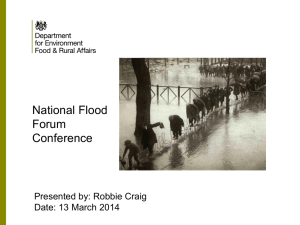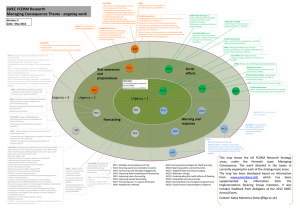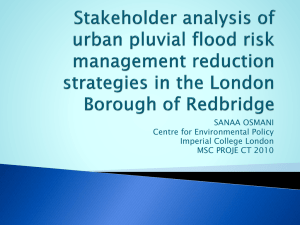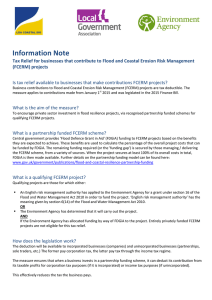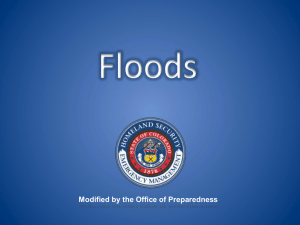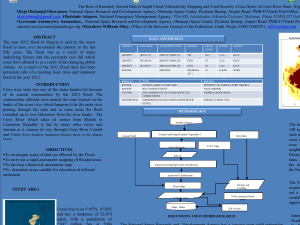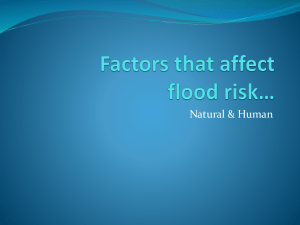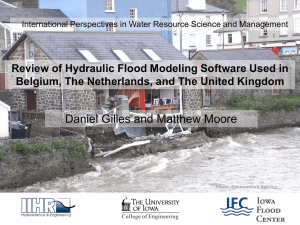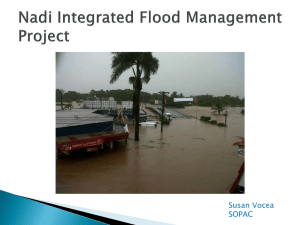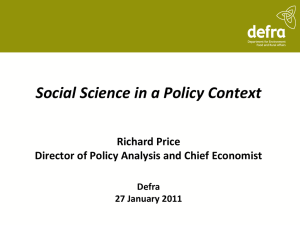UK Flood and Coastal Erosion Risk Management Research Strategy
advertisement
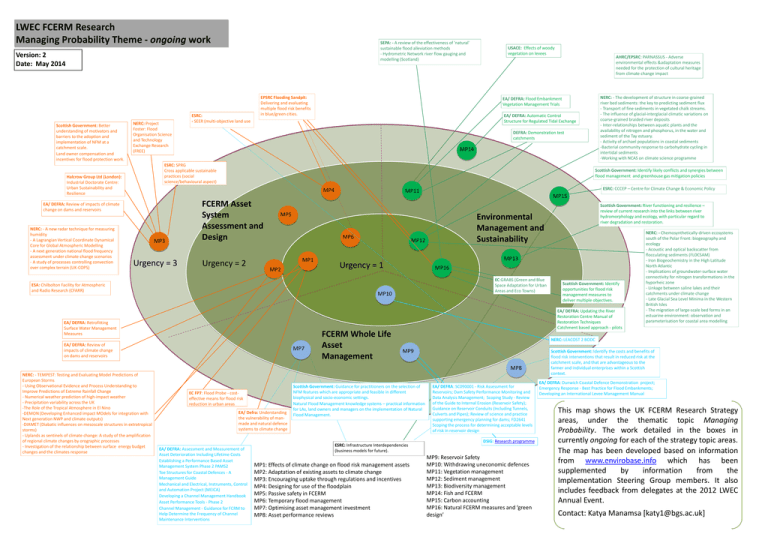
LWEC FCERM Research Managing Probability Theme - ongoing work SEPA: - A review of the effectiveness of 'natural' sustainable flood alleviation methods - Hydrometric Network river flow gauging and modelling (Scotland) Version: 2 Date: May 2014 Scottish Government: Better understanding of motivators and barriers to the adoption and implementation of NFM at a catchment scale. Land owner compensation and incentives for flood protection work. NERC: Project Foster: Flood Organisation Science and Technology Exchange Research (FREE) AHRC/EPSRC: PARNASSUS - Adverse environmental effects &adaptation measures needed for the protection of cultural heritage from climate change impact EA/ DEFRA: Automatic Control Structure for Regulated Tidal Exchange DEFRA: Demonstration test catchments MP14 Scottish Government: Identify likely conflicts and synergies between flood management and greenhouse gas mitigation policies MP4 EA/ DEFRA: Review of impacts of climate change on dams and reservoirs MP3 Urgency = 3 FCERM Asset System Assessment and Design Urgency = 2 ESRC: CCCEP – Centre for Climate Change & Economic Policy MP11 MP15 MP5 MP6 MP1 MP2 ESA: Chilbolton Facility for Atmospheric and Radio Research (CFARR) MP13 Urgency = 1 EA/ DEFRA: Review of impacts of climate change on dams and reservoirs MP7 FCERM Whole Life Asset Management MP16 EC:GRABS (Green and Blue Space Adaptation for Urban Areas and Eco Towns) EA/ Defra: Understanding the vulnerability of manmade and natural defence systems to climate change EA/ DEFRA: Assessment and Measurement of Asset Deterioration Including Lifetime Costs Establishing a Performance Based Asset Management System Phase 2 PAMS2 Toe Structures for Coastal Defences - A Management Guide Mechanical and Electrical, Instruments, Control and Automation Project (MEICA) Developing a Channel Management Handbook Asset Performance Tools - Phase 2 Channel Management - Guidance for FCRM to Help Determine the Frequency of Channel Maintenance Interventions Scottish Government: Identify opportunities for flood risk management measures to deliver multiple objectives. EA/ DEFRA: Updating the River Restoration Centre Manual of Restoration Techniques Catchment based approach - pilots NERC: - Chemosynthetically-driven ecosystems south of the Polar Front: biogeography and ecology - Acoustic and optical backscatter from flocculating sediments (FLOCSAM) - Iron Biogeochemistry in the High Latitude North Atlantic - Implications of groundwater-surface water connectivity for nitrogen transformations in the hyporheic zone - Linkage between saline lakes and their catchments under climate change - Late Glacial Sea Level Minima in the Western British Isles - The migration of large-scale bed forms in an estuarine environment: observation and parameterisation for coastal area modelling NERC: LEACOST 2 BODC MP9 MP8 EC FP7: Flood Probe - costeffective means for flood risk reduction in urban areas Scottish Government: River functioning and resilience – review of current research into the links between river hydromorphology and ecology, with particular regard to river degradation and restoration. Environmental Management and Sustainability MP12 MP10 EA/ DEFRA: Retrofitting Surface Water Management Measures NERC: - TEMPEST: Testing and Evaluating Model Predictions of European Storms - Using Observational Evidence and Process Understanding to Improve Predictions of Extreme Rainfall Change - Numerical weather prediction of high-impact weather - Precipitation variability across the UK -The Role of the Tropical Atmosphere in El Nino -DEMON (Developing Enhanced impact MOdels for integration with Next generation NWP and climate outputs) -DIAMET (Diabatic influences on mesoscale structures in extratropical storms) - Uplands as sentinels of climate change: A study of the amplification of regional climate changes by orographic processes - Investigation of the relationship between surface energy budget changes and the climates response NERC: - The development of structure in coarse-grained river bed sediments: the key to predicting sediment flux - Transport of fine sediments in vegetated chalk streams. - The influence of glacial-interglacial climatic variations on coarse-grained braided river deposits - Inter-relationships between aquatic plants and the availability of nitrogen and phosphorus, in the water and sediment of the Tay estuary. - Activity of archael populations in coastal sediments -Bacterial community response to carbohydrate cycling in intertidal sediments -Working with NCAS on climate science programme EA/ DEFRA: Flood Embankment Vegetation Management Trials ESRC: SPRG Cross applicable sustainable practices (social science/behavioural aspect) Halcrow Group Ltd (London): Industrial Doctorate Centre: Urban Sustainability and Resilience NERC: - A new radar technique for measuring humidity - A Lagrangian Vertical Coordinate Dynamical Core for Global Atmospheric Modelling - A next generation national flood frequency assessment under climate change scenarios - A study of processes controlling convection over complex terrain (UK-COPS) ESRC: - SEER (multi-objective land use EPSRC Flooding Sandpit: Delivering and evaluating multiple flood risk benefits in blue/green cities. USACE: Effects of woody vegetation on levees Scottish Government: Guidance for practitioners on the selection of NFM features which are appropriate and feasible in different biophysical and socio-economic settings. Natural Flood Management knowledge systems – practical information for LAs, land owners and managers on the implementation of Natural Flood Management. ESRC: Infrastructure Interdependencies (business models for future). MP1: Effects of climate change on flood risk management assets MP2: Adaptation of existing assets to climate change MP3: Encouraging uptake through regulations and incentives MP4: Designing for use of the floodplain MP5: Passive safety in FCERM MP6: Temporary flood management MP7: Optimising asset management investment MP8: Asset performance reviews EA/ DEFRA: SC090001 - Risk Assessment for Reservoirs; Dam Safety Performance Monitoring and Data Analysis Management; Scoping Study - Review of the Guide to Internal Erosion (Reservoir Safety); Guidance on Reservoir Conduits (Including Tunnels, Culverts and Pipes); Review of science and practice supporting emergency planning for dams; FD2641 Scoping the process for determining acceptable levels of risk in reservoir design DSIG: Research programme MP9: Reservoir Safety MP10: Withdrawing uneconomic defences MP11: Vegetation management MP12: Sediment management MP13: Biodiversity management MP14: Fish and FCERM MP15: Carbon accounting MP16: Natural FCERM measures and ‘green design’ Scottish Government: Identify the costs and benefits of flood risk interventions that result in reduced risk at the catchment scale, and that are advantageous to the farmer and individual enterprises within a Scottish context. EA/ DEFRA: Dunwich Coastal Defence Demonstration project; Emergency Response - Best Practice for Flood Embankments; Developing an International Levee Management Manual This map shows the UK FCERM Research Strategy areas, under the thematic topic Managing Probability. The work detailed in the boxes in currently ongoing for each of the strategy topic areas. The map has been developed based on information from www.envirobase.info which has been supplemented by information from the Implementation Steering Group members. It also includes feedback from delegates at the 2012 LWEC Annual Event. Contact: Katya Manamsa [katy1@bgs.ac.uk]
